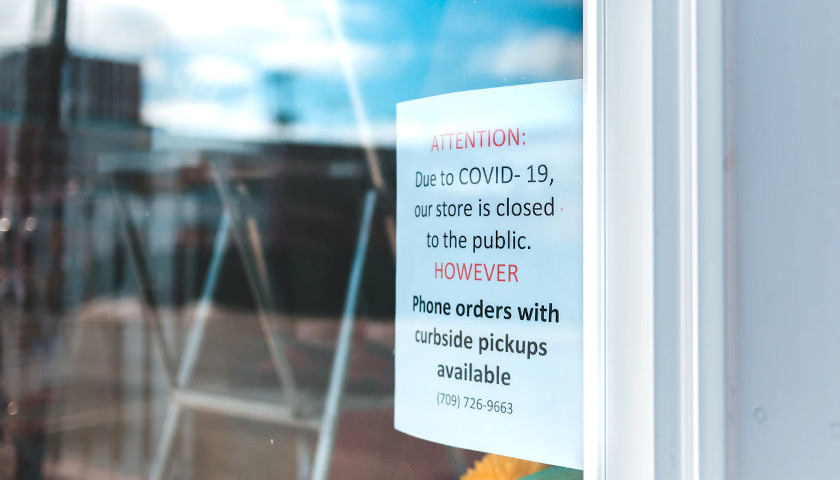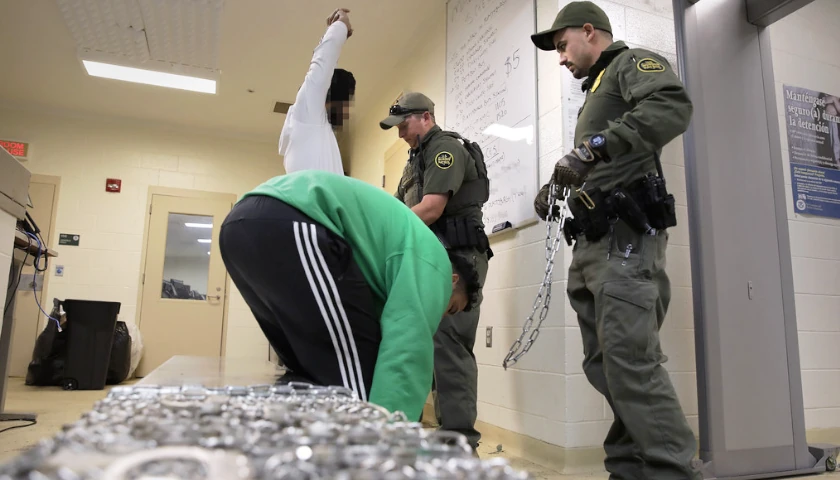by Virginia Allen
California small businesses are crumbling under the weight of a new stay-at-home order and a lack of meaningful financial assistance.
Democratic Gov. Gavin Newsom issued a new region-based lockdown order for California on Dec. 3, forcing more California businesses to close their doors or severely limit operations.
“We are at a tipping point in our fight against the virus, and we need to take decisive action now to prevent California’s hospital system from being overwhelmed in the coming weeks,” Newsom said in a statement announcing the new restrictions.
The Regional Stay at Home Order divides the state into five distinct regions: Northern California, the Bay Area, Greater Sacramento, the San Joaquin Valley, and Southern California. Regions automatically enter into a stay-at-home order when intensive care unit bed availability falls below 15%.
As of Tuesday night, Northern California is the only region of the state not under the new stay-at-home order, which prohibits indoor or outdoor restaurant seating and forces bars, hair salons, museums, and other entities to close.
“California small businesses have been pushed to their limit as they struggle to find ways to remain open,” Mark Herbert, vice president of California’s Small Business Majority, said in a Dec. 17 statement.
A Lake Research Partners poll of 418 small businesses in California conducted for Small Business Majority between Nov. 10 and Nov. 23 revealed that “one-third have cut employee hours, a quarter have reduced employee wages, and another quarter have changed their business model.”
Now that California has tightened restrictions further, the number of small businesses being forced to cut employee wages and hours likely will rise.
The Daily Signal spoke with several Los Angeles County small business owners to find out how they are surviving under the lockdown measures and what they would like to say to Newsom and to Los Angeles Mayor Eric Garcetti if given the opportunity.
Howard Konishi says he has a passion for introducing people to new hobbies and interests. That’s why, in 2013, he opened Top Out Climbing Gym to share his love of rock climbing with his community.
“My philosophy is, anyone that walks into our business, I give them an opportunity to decide whether they want rock climbing in their lives or not,” Konishi told The Daily Signal in a phone interview Dec. 16. For some, he said, climbing can have a positive impact on their lives “mentally, physically, and they can make friends as well.”
For the first seven years of owning the gym, Konishi said, the business grew more every year. At the start of 2020, the gym had about 800 members with a core staff of 10 or 11.
When the pandemic led to lockdowns in March, Konishi, 39, thought he would only have to close his business for three weeks. He said he was happy to do so in order to keep his community safe.
Over the past nine months, the gym was able to reopen for only three weeks during the summer before being forced to close again.
“It almost seems like we are a forgotten industry,” Konishi said, adding that it’s frustrating when one sees another business, such as a big-box store, that is allowed to keep operating, but you are forced to shut down. “It’s almost like paying for a house … that you cannot live in, but you are still expected to pay property taxes and rent and all that stuff. It’s tough. I know it’s for the good of the community, but I am just trying to survive here.”
Since the gym already operated under a check-in system and because climbing naturally requires distance between individuals, Konishi says he’s confident that he could operate his business safely if he were given the opportunity to reopen.
Gym members have called Konishi and begged him to reopen, explaining that their children are depressed and need a social outlet in their lives. The gym owner has had to tell them that the situation is out of his control.
If given the opportunity to talk with Newsom and Garcetti, Konishi says, he would ask the leaders to give him and other business owners a chance to reopen because “we know our industry better than anyone else” and can operate safely.
Financially, the gym has been surviving on the business’ savings and the generosity of some loyal members who are still paying their membership fees as a way to support the business, but the money is running out.
“Next month, I don’t know if I’m going to be able to make my rent payment on time,” Konishi said.
The dream of being able to reopen and have climbers back in the gym, even at limited capacity, is what he says is sustaining him right now.
“Sometimes, I will walk throughout the facility. Even though it’s empty, I imagine climbers climbing on the wall,” Konishi said before pausing for a moment to regain his composure as he held back tears. “I can see climbers climbing on the wall, and people being happy, and you know that image helps me get through the tough times.”
Corniche Travel in West Hollywood
The travel industry has suffered significant financial losses during the pandemic as nations close borders and even some states discourage travel across their state lines.
Despite an awareness of the pandemic’s impact on airlines and cruise lines, travel agencies have been largely forgotten, says Anastasia Mann, owner of Corniche Travel.
Mann, 73, opened her own travel company 33 years ago and has 24 employees, some of whom have been with her since the beginning.
“My goal is to protect [my employees],” Mann told The Daily Signal in a Dec. 16 phone interview.
The federal Paycheck Protection Program provided the company some relief, but the rules of the program required the money be used within 60 days, Mann said. Once the two months were up, she immediately had to cut staff hours and wages.
Now, Mann is dipping into her personal savings in order to pay her staff and provide them with insurance.
“I am depleting my own savings in order to protect my employees,” she said. “I don’t know what else to do, but obviously, I cannot do that forever, which is why we need a new stimulus package.”
The challenge for travel companies? “We have zero options,” Mann said. “We don’t have takeout or delivery. We cannot tell someone to get on an airplane.”
To make a challenging situation even harder, California’s minimum wage will rise to $12 an hour for businesses with 25 employees or fewer, and $13 an hour for businesses with 26 or more employees, on Jan. 1.
The Golden State’s labor laws require that when the minimum wage goes up, the minimum exempt salary must be double the new minimum wage. That means Mann will be required to increase her salaried employees’ annual pay by about $5,000 each.
The salary increase means that “my business, which [has] basically a [1% to 2.5%] margin at most for potential profit, is screwed,” Mann said, adding, “It’s like beating a horse that’s already drinking out of an empty [trough].”
She said she would like to see California put a waiver on the labor law because right now, it would only add “insult to injury.”
Red Ball Fun Zone in Long Beach
The Red Ball Fun Zone in Long Beach, California, combines high-energy exercise with fun and games for kids. David Cain, owner of the gym for kids, launched the business to show young people just how fun exercise can be.
“It was like a Disneyland of fitness,” Cain said of the gym in a Dec. 16 call with The Daily Signal.
Cain’s passion for children’s health and fitness led him to launch a nonprofit five or six years ago called America’s Healthy Kids, which hosts high-energy exercise events, usually outdoors, for kids and families. But now, both Cain’s nonprofit and his gym, which he opened less than a year before the pandemic, have been completely shut down since March.
Under the stay-at-home order, gyms are allowed to operate outdoors, so Cain asked the city for permission to do so. With his experience hosting outdoor exercise events for the nonprofit, he was confident the gym could transition to outdoor child-friendly workouts. But the city declined his request because it classified him not as a gym, but as an amusement and entertainment center.
The city also said his workouts were too high-touch as they incorporate balls and other objects. Cain said he would require the children to wear gloves, but still the city said he had to remain closed.
To make matters worse, Red Ball Fun Zone is located in the Long Beach Town Center shopping mall, which is owned by the city. Long Beach has threatened to evict Cain because he cannot afford to pay his rent.
Meanwhile, Cain estimates that the Sam’s Club big-box store located in the same shopping center as his business has had “between 1.3 [million] and 1.5 million people walk through” since the onset of the COVID-19 pandemic.
The small business owner says what he really needs now is a grant, not loans, because “I already took on my debt when I opened this business. I already took on my risk.”
Cain added that a concept like “eminent domain [should] come in here somewhere. When the government takes what you have, they should pay you for what they took.”
Cain did receive a grant from the city of Long Beach for $7,000, but he also owes the city $74,000 in rent.
Cain is determined to reopen his business, even if he has to relocate and “move to another county … because L.A. County … they are crushing everybody,” he said.
Pineapple Hill Saloon in Sherman Oaks
Angela Marsden, the owner of Pineapple Hill Saloon, drew national news attention when she posted a video on her Facebook page that quickly went viral.
In the video, Marsden is close to tears as she points out an outdoor dining area set up by a movie crew just a few yards away from her closed outdoor patio restaurant.
Marsden was forced to close her restaurant’s patio under California’s Dec. 3 stay-at-home order, which allows restaurants to operate only through delivery and pickup services.
When she arrived at her restaurant on Dec. 4 to give her employees their final checks and bags of groceries, Marsden saw the movie crew’s dining area. The city had given the film company a free pass to set up a large tent with tables, chairs, and a catering truck, which Marsden said felt like “a slap in my face.”
“I’m losing everything,” Marsden said on the viral video. “Everything I own is being taken away from me. And they set up a movie company right next to my outdoor patio. … They have not given us money, and they have shut us down. We cannot survive. My staff cannot survive.”
In an interview with PragerU’s Will Witt published Dec. 9, Marsden said she has lived in California for 28 years and despite the challenges, does not want to flee the state.
“I don’t want to leave this place in disarray,” she told Witt. “Somebody has to start telling the truth.”
The hypocrisy has become so intolerable, Marsden says, that she felt she had to begin speaking up. When politicians tell small businesses they have to close and people must stay home, that puts restaurant owners and other business owners in the position of having to “make a choice now between eating and having a place to live.”
What California needs now, she said, are politicians who will “think outside the box and … think with their heart and … think for their people.”
– – –
Virginia Allen is a news producer for The Daily Signal. She is the co-host of The Daily Signal Podcast and Problematic Women.




